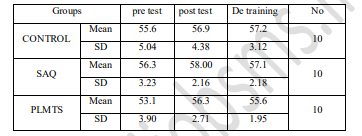EFFECT OF PLYOMETRIC TRAINING AND SAQ TRAINING FOLLOWED BY DETRAINING ON SELECTED BIO-MOTOR ABILITIES OF INTER-COLLEGIATE LEVEL FOOTBALLERS
Keywords:
Plyometric training, SAQ training and Football.Abstract
Thirty male soccer players aged between 18 and 26 years from Nirmala college in Ernakulam District, Kerala were selected. They were randomly divided into three groups of ten each, out of which group I (n = 10) consisted of SAQ (speed, agility, quickness) training, group II (n = 10) consisted Plyometric training and group III (n = 10) consisted control group. The selected bio-motor abilities were speed endurance and strength endurance. The season of training period was divided into three. The first training season was later pre-season, which consisted of four weeks of training with three days (three sessions) of training and before the training session was a rest day. The second training season was the In-season, which consisted of two weeks with two days (two sessions) of training and before the training session was a rest day. The third training season was in the closed-season, which consisted of two weeks. The subjects of SAQ group and Plyometric group were made to undergo de-training. Pre-test was conducted for all the three groups before giving the training and post-test was conducted after 6 weeks of training. The de-training effect was measured after the two weeks of de-training. The statistical technique used was ANCOVA. The results of the study showed that SAQ training improved speed endurance better than Plyometric training whereas Plyometric training improved strength endurance better than SAQ training after 6 weeks of training programme. The results of the 2 weeks de-training programme showed that there was no significant improvement in speed endurance and strength endurance for both SAQ training and Plyometric training among the male inter-collegiate level footballers.
Metrics

Downloads
Published
How to Cite
Issue
Section
License
© 2025 International Journal of Behavioral Social and Movement Sciences. All Rights Reserved.
All content published in this journal, including articles, images, and other intellectual property, is protected by copyright law. No part of this publication may be reproduced, distributed, or transmitted in any form or by any means without the prior written permission of the publisher.
For permissions and inquiries, please contact us at: editor@theuniversityacademics.com
License Terms for Publications in International Journal of Behavioral Social and Movement Sciences
By submitting an article to the International Journal of Behavioral Social and Movement Sciences, authors agree to the following terms:
-
License Grant:
-
Authors retain copyright for their work. However, by submitting their work, authors grant the journal a non-exclusive, worldwide, royalty-free license to publish, reproduce, distribute, display, and otherwise use the article in any form and medium (print or digital) in perpetuity.
-
-
Open Access:
-
Articles published in this journal are made freely available to the public under the terms of an open-access license. The journal allows anyone to access, download, copy, distribute, print, search, or link to the full text of the articles.
-
-
Attribution:
-
Authors are required to provide proper citation and attribution to the original article when reusing or referencing content. The attribution should include the author(s), title of the article, journal name, volume, issue, and publication year.
-
-
Reuse of Material:
-
Authors may reuse their published work for non-commercial purposes, including reprinting in other publications or personal websites, provided proper attribution is given to the original publication.
-
-
Creative Commons License:
-
The journal may publish articles under a Creative Commons Attribution 4.0 International License (CC BY 4.0), which allows others to remix, adapt, and build upon the work, even for commercial purposes, as long as they give appropriate credit to the original author(s).
-
-
Peer Review:
-
The submitted article will undergo a thorough peer-review process, and the final decision regarding publication rests with the editorial board of the journal.
-
-
Withdrawal:
-
Once accepted for publication, articles may only be withdrawn with the approval of the editorial board and must not be published elsewhere in any form without prior written consent.
-












